Menstruation Influences Poverty
In Venezuela, women’s natural condition becomes a silent healthcare problem and an attack on their dignity and human rights.


Photo: Cristian Hernández
In the 80s, when Katiuska Camargo was a teenager and needed sanitary pads, she’d send her siblings to the store for “American cookies.” They used that codeword because in their home, at Petare’s San Blas slum, the menstrual period was taboo. Neither mother nor daughter touched the subject. In fact, Katiuska’s period arrived in whispers: her grandmother and her locked themselves in the bathroom to talk about what would happen to her body and her life. Her grandmother, a little more flexible regarding the subject, told her about a time without pads or tampons, when menstrual hygiene depended on a white cloth that they’d have to wash with boiling water and scrub away. They smelled like salt and rust. Humiliating.
Four decades later, on the other side of town, near the presidential palace, Iraimar Ríos —13 years old, sophomore at the Liceo Santos Michelena, with a loud laugh and sparkling eyes—doesn’t have that problem: “It’s only women in my house, so we’ve always talked about my period.” She has another problem, though, which she shares with her mom, Maria Fernanda: “Sometimes I don’t have pads, and when I do, there’s no running water at school. I can’t change so I stain my clothes.” When this happens, Iraimar skips school.
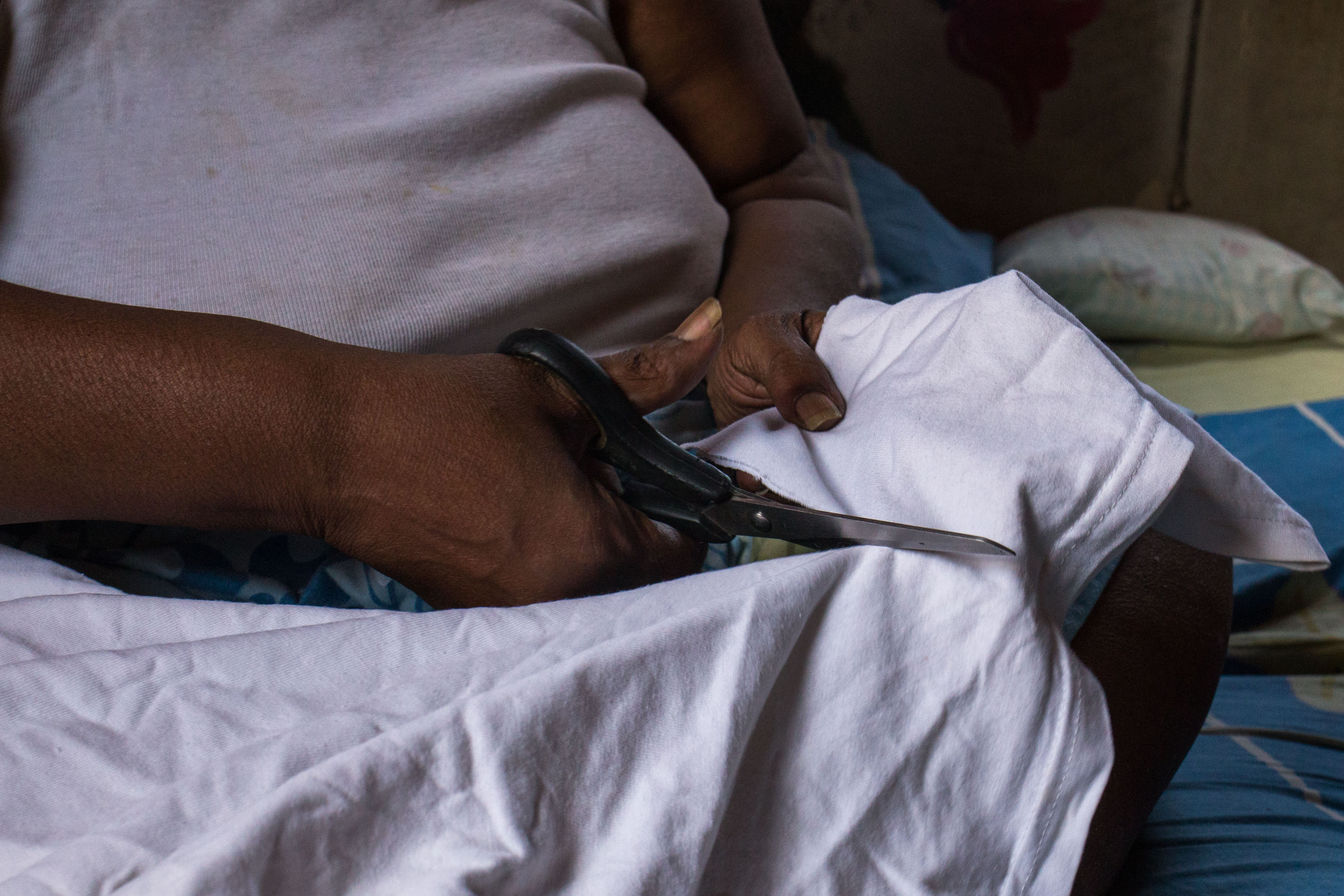
Iraimar’s grandmother, Miriam, shows how they make homemade compresses with an old shirt. Photo: Cristian Hernández. Cotiza, 2019.
In hyperinflation Venezuela, you have to make do with temporary pads made of old socks, toilet paper or cardboard. It carries risks; Rubén Peralta, gynecologist specialized in fertility, says it increases the rate of infections and even if there’s no official data, he says that Venezuela must have a rate of gynecological infections higher than Sub-saharan Africa: “Gynecological infections are like any other infection, and they can kill patients.”
Blood As a Gender Gap
Getting an infection amid a complex humanitarian emergency is a serious danger, but beyond this, sanitary pad shortages have a socio-economic dimension and it’s a human rights issue. “The menstrual cycle is one of the factors contributing to the poverty cycle,” says Peralta. “Women who lack access to menstrual hygiene products are more likely to remain in poverty, they often miss school or work. On the other hand, because they don’t have access to pads, there are physical and emotional consequences. They’re more vulnerable to sexual abuse because their period is spotted by sexual assaulters.”
For over four years, this doctor has studied the global impact on women’s lives of what’s known as menstrual poverty: lack of access to sanitary products, education about menstrual hygiene, bathrooms, facilities to wash your hands and waste management. Human Rights Watch sees it as a threat to dignified life, because it’s reflected on “many other human rights, like the rights to education, work and health.”
In Venezuela, according to NGO Plafam, there’s a 90% shortage of medicines and supplies in the public healthcare system. They also estimate that public or NGO programs for family planning and attention to sexual health only cover 22% of the population, resulting in poor access to birth control and femenine hygiene products.
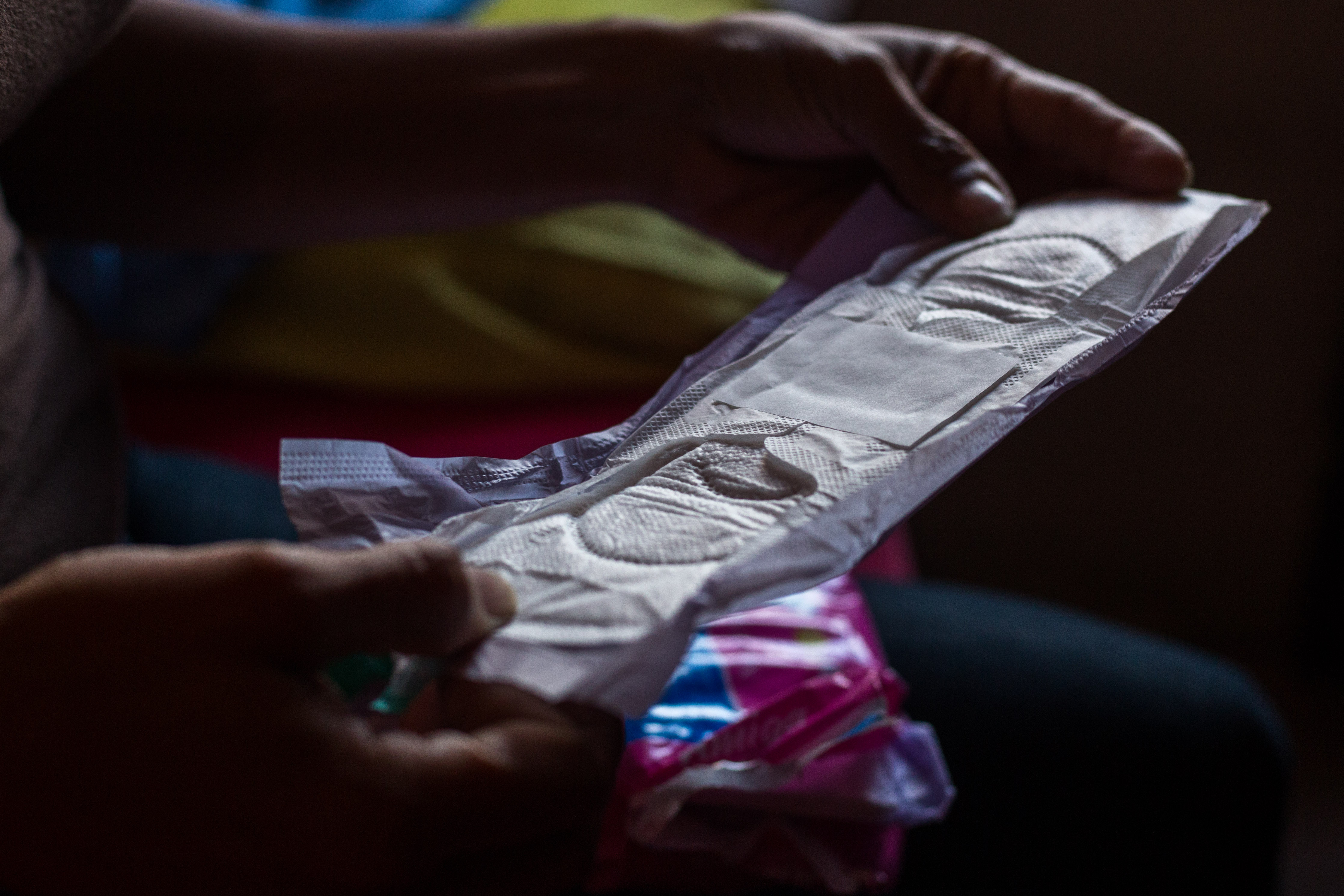
The shortage of menstrual hygiene products has decreased, but still few women can buy them. Photo: Cristian Hernández. Cotiza, 2019.
In 2016, Kimberly-Clark —one of the global leaders in hygiene products— shut down production in Aragua. The government took over the plant, renamed it Planta Productiva Cacique Maracay, and the products disappeared from the shelves or became impossible to buy. The following year, Johnson & Johnson paralyzed its factory in Carabobo for lack of raw materials and because producing 32 pads costs Bs.F. 4,000, but had to be sold at Bs.F. 400 back then.
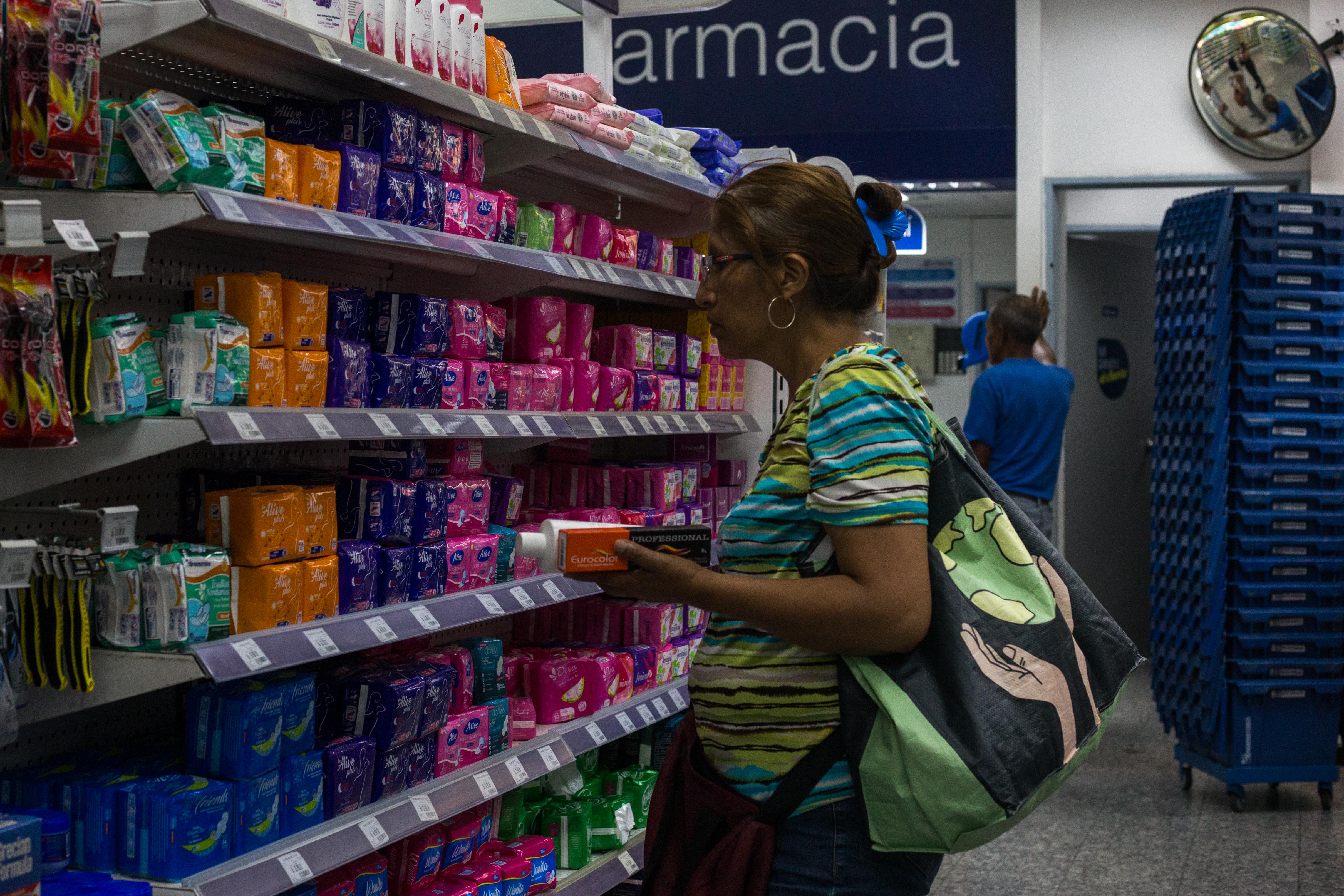
Unknown brands of menstrual hygiene products can be found at the Farmatodo in El Silencio. Photo: Cristian Hernández. 2019
We can now find several knock off off brands to those international products. They use the same colors, typography and design, but they’re called Nature, Aluays, and Be Alive, they’re worth a half or a full minimum wage and they often come with side effects. Poor quality pads are available because Resolution 263 placed them on a list of 1,055 products that “aren’t considered health supplies” and shouldn’t require sanitary authorization. Allarí Puello, a 47-year-old domestic worker, prefers using old pieces of cloth. “Sanitary pads are too expensive and I try to use them only when I’m bleeding too much. Besides, I get a rash from those weird Chinese brands that they sell by the unit in Petare.”
Many women in Venezuela sometimes can’t leave the house because they don’t have pads or tampons, or working bathrooms, water, detergent to wash their clothes or painkillers for cramps.
“There’s a lot of disinformation. There’s little education on menstrual rights, so there are many myths about the topic, passed down from mothers and grandmothers,” says Estefanía Reyes, general director of Proyecto Mujeres, an NGO that teaches sexual health and menstrual rights to children and parents in a Maracaibo Fe y Alegría school.
This foundation surveyed 79 children from 14 to 17 years old: 93.7 % said they felt unsafe in the school bathrooms, 33.3 % said they sometimes skip school because of their periods and 67.9 % took myths about the menstrual cycle as truth. “The virginity myth, for example, is still true for these teenagers,” says Reyes. “It’s one of the main concerns of the mothers when they’re shown the alternative for menstrual hygiene, like the cup or tampons. Many teenagers don’t want to use these products because they think that if their families see them, they’ll think they aren’t virgins anymore.”
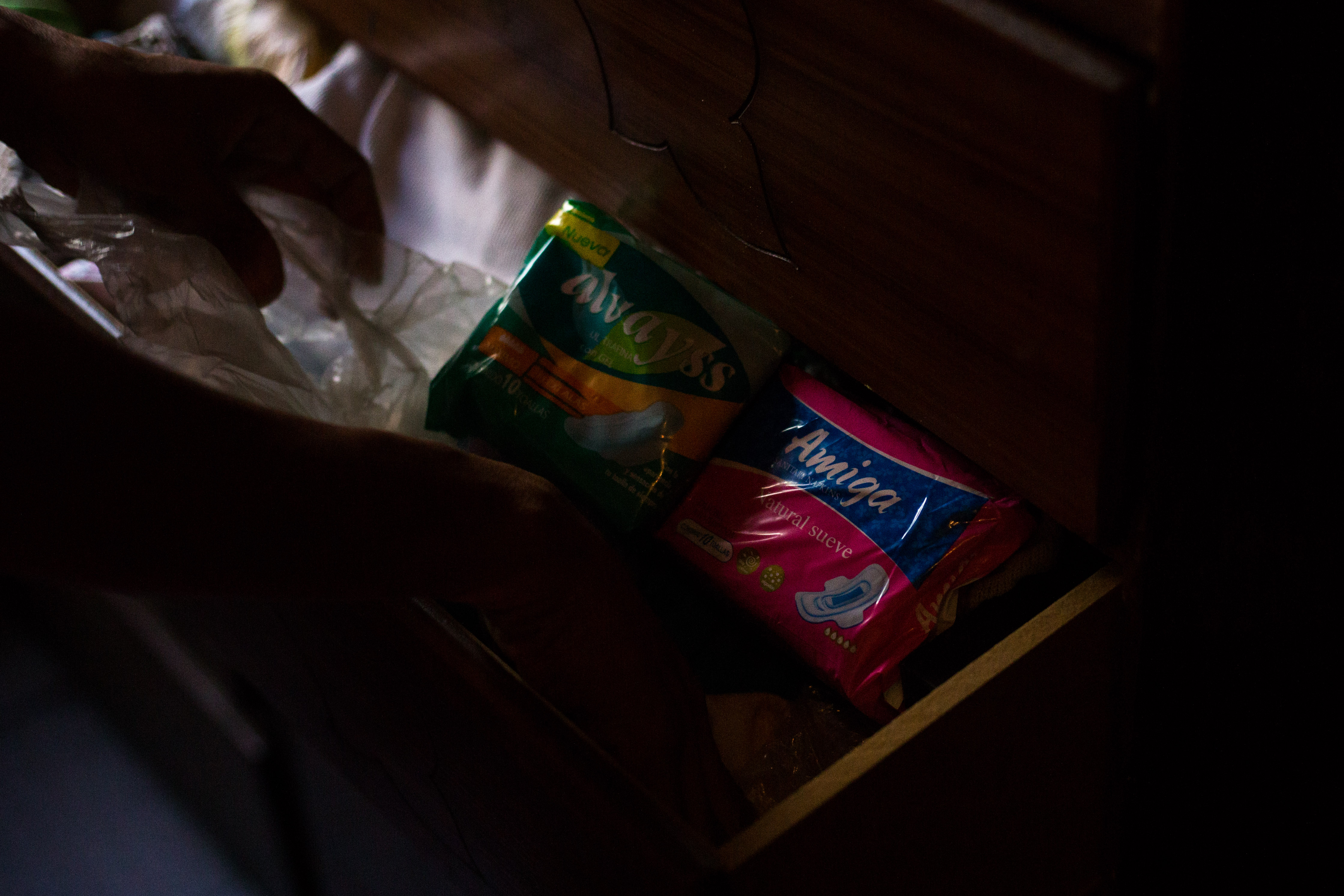
In Venezuela, menstrual hygiene products don’t require sanitary authorization. Photo: Cristian Hernández. Cotiza, 2019.
A Sustainable Solution
Marian Gómez, for example, has always been curious and that’s how she saw the menstrual cup, online, when she was 14. She had to wait for years to get one and found it thanks to a friend. After going through her own experience, she decided to become an entrepreneur and allow Venezuelans to have access to this sustainable hygiene method, that goes for $10 to $20 and it can last seven years, with practically no secondary effects. She got in touch with a Chilean provider and launched The Cup Ve. “I was worried there wasn’t information from doctors, why was nobody talking about this? The last gynecologist I went to, for example, didn’t know what the menstrual cup was.”
The cup was also the solution for sisters Marianne and Véronique Lahaie Luna, with Rosana Lezama. Marianne is an intern in the Environmental Health Department of Harvard T. H. Chan Public Health, while Véronique and Rosana are Ottawa University Alumni. In 2017, they started fundraising to donate cups to Venezuelan women and Venezuelan migrants in Colombia. Through NGO Lahaie Luna Lezama, they started a pilot project for menstrual rights education with Plafam, helping over 100 women. In 2019, they donated over 400 menstrual cups to Venezuelan migrants. 80% of the women who benefited from this project said that the cup has drastically changed their daily lives while on their period.
Rubén Peralta says the most important thing is that the State assume menstrual rights as a public healthcare concern and that menstrual hygiene products are tax free and available for free in public schools: “The second measure should be to provide long lasting hormonal birth control, because it decreases the blood flow and reduces the crippling discomfort.”
“This is ideal for teenagers, because we also have to fight with our teenage pregnancy rate.” According to the report “The power to decide” published by the UNFPA in 2018, Venezuela is the third country with the highest teenage pregnancy rate —95 out of every 1,000 teenagers between 15 and 19 years old are pregnant, behind Honduras (103) and Ecuador (111).
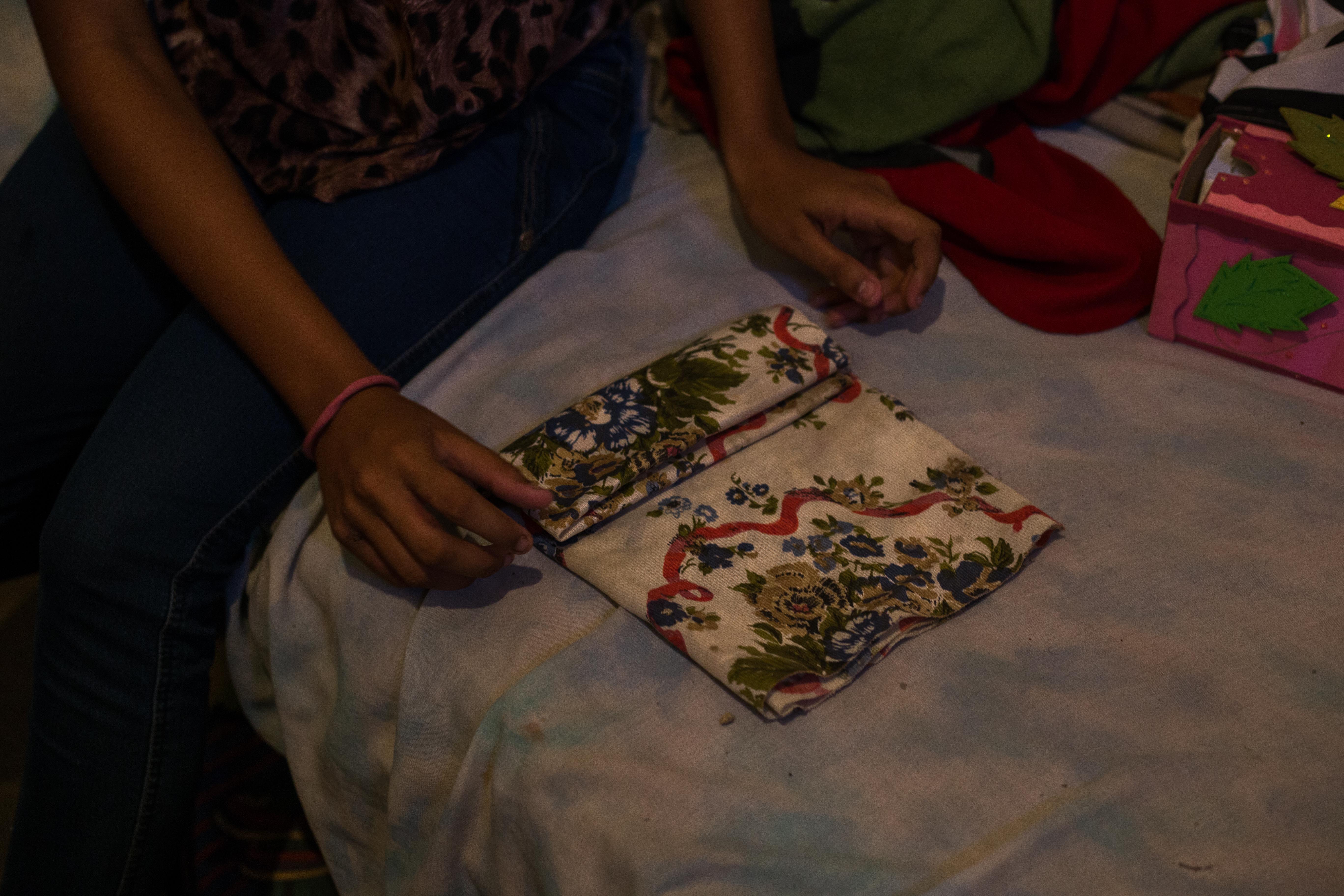
Iraimar, 13, shows her box of menstrual products. It has a sanitary towel and a piece of old cloth she uses in emergencies. Photo: Cristian Hernández. Cotiza, 2019.
Plafam, which has fought for gender equality, abides by Article 50 of the Protection of Children and Teenagers Law, that establishes that “every person over the age of 14 has the right to request information and sexual health services.” In many cases, however, there’s still shame in requesting further details or going on their own.
Marian’s ambition is to end taboos, that women recognize their own bodies and that the cup becomes available in every pharmacy and store in the country. “The cringe is cultural, learned, and it comes from disinformation. How’s it possible that semen is less gross than your own blood? You see Tarantino movies and aren’t grossed out by them.”
Caracas Chronicles is 100% reader-supported.
We’ve been able to hang on for 22 years in one of the craziest media landscapes in the world. We’ve seen different media outlets in Venezuela (and abroad) closing shop, something we’re looking to avoid at all costs. Your collaboration goes a long way in helping us weather the storm.
Donate




